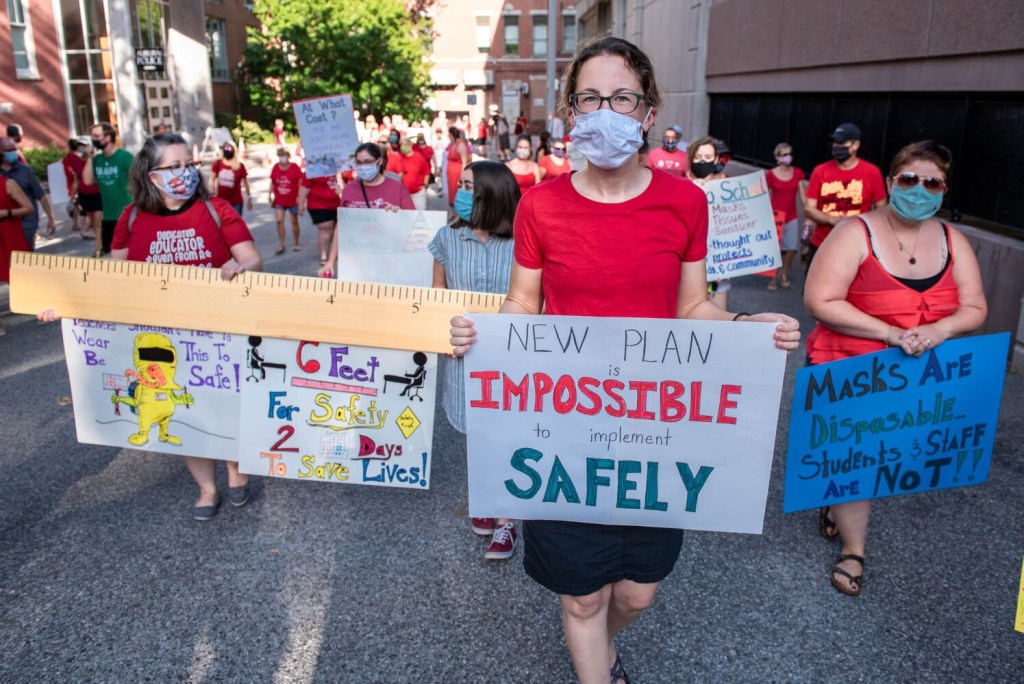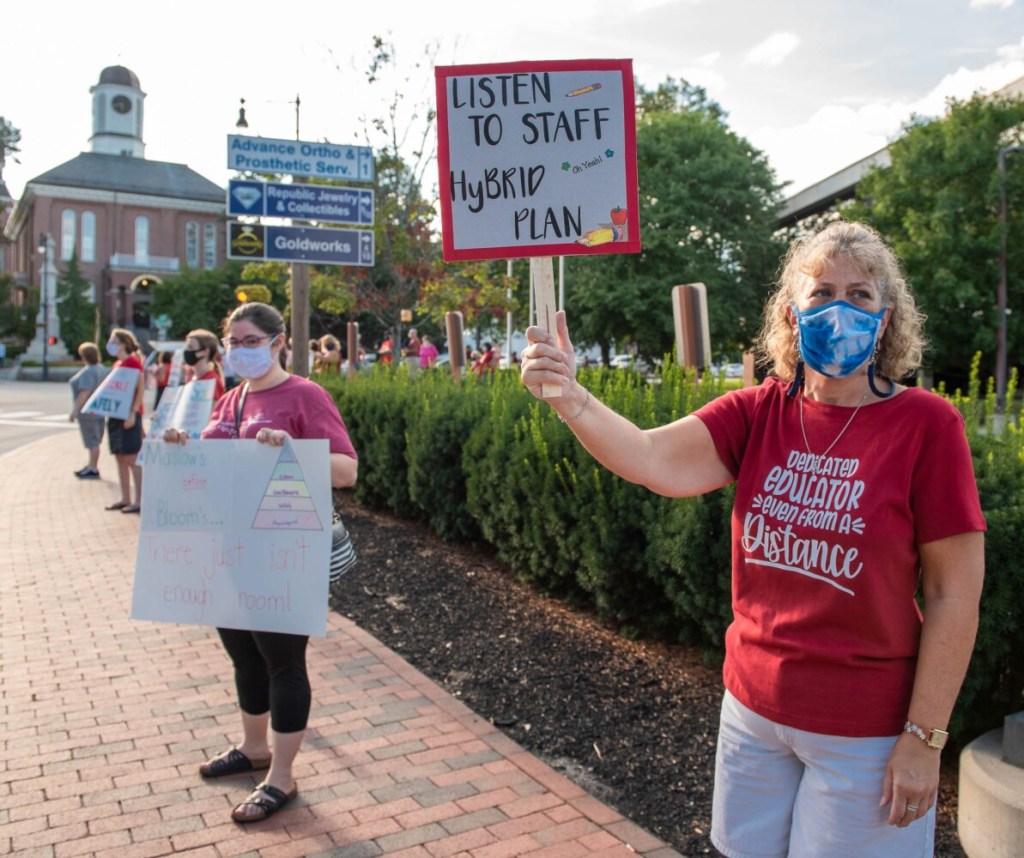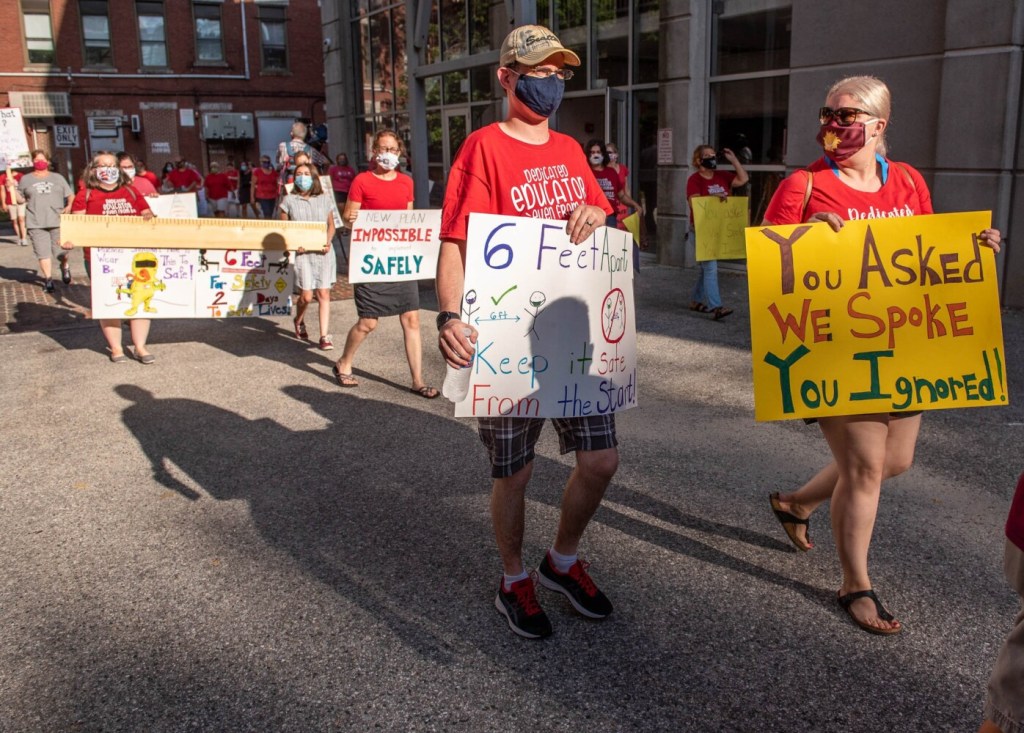AUBURN — More than 100 teachers, parents and students held a demonstration Wednesday outside of Auburn City Hall to speak out against the back-to-school plan that the Auburn School Committee approved at its Aug. 5 meeting.

Kristi McCarthy, a teacher at Walton School, waves to traffic on Court Street in Auburn on Wednesday during a demonstration to advocate for a return-to-school plan that takes a more cautious approach to COVID-19 prevention. Andree Kehn/Sun Journal Buy this Photo
The School Committee voted 4-2 on Aug. 5 for a plan that would offer parents and students the choice of having students in school two days a week or four days a week, with an additional third option for full remote learning.
Earlier that evening, a vote for a plan that would have students in school two days a week with three days of remote education failed after a 3-3 split.
That measure failed in large part because of incomplete information: the committee doesn’t know for sure how many students plan to come back for in-person learning and how many plan to stick with the remote option. With strict state guidelines in mind, the School Department is not completely certain whether they have enough space in their schools to meet social distancing mandates.
Teachers and parents, wearing red and holding homemade signs on both sides of Court Street, met outside of Auburn City Hall at 5:30 p.m., a half hour before the start of the Auburn School Committee meeting.
Bree Crocker, a second grade teacher at Sherwood Heights Elementary School and the vice president of the Auburn Education Association, said that she and the rest of the teachers in Auburn want more than anything to return to school, but only if the safety of students and teachers can be ensured.
“The AEA had a member on the school department’s reopening committee,” Crocker said Wednesday evening. “It was a group with a lot of teacher, parent and administrative input, and they put out a well-thought out hybrid model. We want to see that hybrid model back.”
Crocker said the demonstration was the result of an emergency meeting by the AEA following the Aug. 5 vote.
“We wanted to find a way to politely respond to the shocking news from the meeting, and what better way than to get teachers, parents and other community members out here to share their voices,” Crocker said.
Heather Oinonen, a special education teacher with the Auburn School Department, was holding a sign with her daughter that showed a teacher in a Hazmat suit, framed by the text, “Teachers shouldn’t have to wear this to be safe!”
Oinonen said that the hybrid model was a “safe plan with logic put into it and took months of consideration.”
“(The committee) threw it out based on their own personal feelings, their own needs and their own agendas,” Oinonen said. “They did an injustice to everybody in the community. An outbreak would affect everyone in the community, not just those in the schools.”
She added that the hybrid model “wouldn’t be in place forever.”
“It would be adjusted as needed,” Oinonen said.
As the Auburn School Committee meeting got underway at 6 p.m., a large number of the people demonstrating inside made their way indoors to speak to the committee directly.
Heidi Lachapelle, a former school committee member, urged the committee to reconsider their vote and accept the hybrid model.
“The plan has been accepted by RSU 16, MSAD 52, and Lewiston,” Lachapelle pointed out. “Your role as school committee members is to act in the best interest of our children. (Suggesting) a new plan and expecting teachers to figure it out is irresponsible, disrespectful and unrealistic.”
Todd Chretien and Marissa Moreau, Spanish teachers at Edward Little High School, both spoke to the extra burden that the committee’s plan would place on the World Languages department at the high school, a department they say is already overburdened.
Chretien said that it is “our responsibility, as educators, to protect our kids.”
He pointed out that a large number of students have expressed interest in returning to school four days a week, which is “a recipe for allowing this virus to gain a foothold.”
Chretien added that the virus “doesn’t affect all people in Maine equally.”
“We have the worst racial disparity virus rate and death rate in the country,” Chretien said. “When people in this room say we’re relatively immune to it, there are communities in our state that are not relatively immune from it, and by going to this four-day plan, it increases their risk.”
Send questions/comments to the editors.









Success. Please wait for the page to reload. If the page does not reload within 5 seconds, please refresh the page.
Enter your email and password to access comments.
Hi, to comment on stories you must . This profile is in addition to your subscription and website login.
Already have a commenting profile? .
Invalid username/password.
Please check your email to confirm and complete your registration.
Only subscribers are eligible to post comments. Please subscribe or login first for digital access. Here’s why.
Use the form below to reset your password. When you've submitted your account email, we will send an email with a reset code.